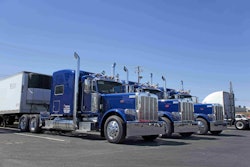 Tom McLeod gives the keynote at the 2016 McLeod User Conference in San Antonio, Sept. 19
Tom McLeod gives the keynote at the 2016 McLeod User Conference in San Antonio, Sept. 19On Monday, Sept. 19, more than 900 trucking professionals gathered at the J.W. Marriott Hill Country Resort on the outskirts of San Antonio for the McLeod Software User Conference.
While traveling to the event over the weekend,a new regulation that impacts transporters of frozen goods, which comprise as much as 25 percent of McLeod customers, went into effect.
Saturday, Sept. 17, was the compliance deadline for a portion of the Food Safety and Modernization Act (FSMA) from the Food and Drug Administration. To comply with the rule, food processors, manufacturers and distributors must have a written plan of their shipping requirements for frozen goods.
“There is going to be a lot of conversation because the carriers are required to implement those requirements by April, 2016,” said Tom McLeod, president of the Birmingham, Ala.-based software developer during his keynote address on Monday morning.
On April 6, 2017, motor carriers and brokers will be expected to comply with part of the FSMA law called the Sanitary Food Transportation Act, a rule that places responsibility on shippers to clearly communicate to carriers how a trailer must be designed, stocked, loaded and unloaded. Each step in the communication process must be dictated and noted for the record.
Any failure by a shipper to dictate a step, or a failure by a carrier to follow through, will have the potential to result in fines and even criminal sanctions.
McLeod said it is a top priority to develop new software features that help carriers and brokers meet these requirements within the next six months.
“We have the capability now to capture most, if not all, the information that a trucking company needs to keep track of,” McLeod told the audience, but added “there is still a fair amount that we can and will do as soon as we know more about the requirements.”
McLeod Software offers enterprise-wide transportation management software (TMS) for motor carriers, brokerage and logistics companies.
Specifically, the company will be adding more flexible configuration options to its LoadMaster and PowerBroker systems for carriers and brokers to manage their shipper profiles, he said. The new profile features will make it possible to automate the documentation process for complying with shipper requirements.
“Trailer wash, driver training and temperature profiles throughout the shipment could vary by shipping location and commodity. They could also vary by receiver,” he said.
Each shipper could have different documentation and reporting requirements for a load prior to pickup, during transit, and after delivery. For example, some shippers may require trailers to be pre-cooled, kept at a specific temperature while in transit, and to have a report before they will accept a shipment at an unloading dock.
“Once they take that, it is theirs,” he explained. “In similar ways, there are interesting conversations about what to do before a driver accepts loads at the point of pickup.”
“We think that flexible reporting that you can produce quickly with minimal effort is going to be critical for carriers with temperature controlled freight,” he said.
Discussion about the FSMA regulation was part of a broader theme during McLeod’s keynote of how to deal with uncertainty.
“Right now it seems there is uncertainty coming from many different areas,” he said, mentioning the presidential race and the economy, noting that freight volumes have increased since 2009 but have been soft in 2016.
One trend McLeod has seen is shippers putting out more freight bids this year and awarding shorter contracts. He mentioned technology the company has for streamlining the bid process.
He predicted the number one disruption to the trucking industry will be the electronic logging device (ELD) rule as the compliance deadline of December, 2017, approaches. He discussed the Driver Feasibility planning tool in the LoadMaster system that can determine whether or not drivers can service a load based on their current and future availability of hours.
“Look for places where there is certainty and things you can control,” he advised. “One thing we can be sure about is that goods are going to continue to move, and predominantly they are going to move by truck.”










